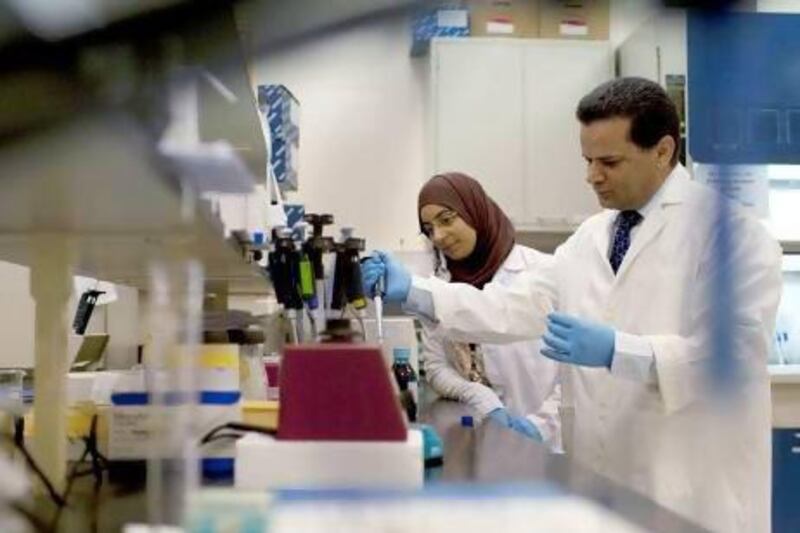AL AIN // UAE University’s genetic research project into the prevention of birth defects has received a grant to continue for another two years.
The Dh500,000 project uses technology to annul the effects of defective genes. It has been running for two years and received another Dh333,000 in April to continue.
The average human genome includes about 25,000 protein-coding genes. Researchers at UAEU use cells grown in culture for their research and introduce a defective gene using a method called transfection.
Transfection works by mixing molecules of a chemical known as siRNA with lipids, which allow the molecules to penetrate the surface of the cell and incorporate in a day or two.
When transfection is complete, researchers can study and manipulate the mutated gene, searching for ways to silence it.
“We introduce molecules that will inhibit our gene of interest,” explained Dr Bassam Ali, an associate professor of molecular and genetic medicine at the university.
“So for a particular cell you’ll have about 10,000 genes that are expressed – meaning the gene is producing a protein and the protein is performing a biological function.
“If their function is not needed for 24 hours, they get silenced naturally.”
But scientists have found that by adding certain chemicals to those molecules, they can silence genes and cells more permanently.
This means that a specific gene can be silenced. Chemotherapy, one of the more popular current treatments for cancer, kills cells indiscriminately and attacks the immune system, but siRNA technology would be able to target only selected cells.
“The idea is that the gene is involved in a disease,” Dr Ali said. “If it’s present in high quantity for instance, or in an abnormal way, it leads to a disease.
“So in theory, if you can block that increase in expression then basically you can reach therapy. For instance, in cancer cells, they might be abnormally expressed all the time during the development or the cell cycle.
“So if you block them, you might be able to reach some sort of therapeutic ends.”
The research may also help against genetic diseases, which are prominent in the nation because of blood-related marriages.
“The UAE is ranked sixth in birth defects out of 200 worldwide, which is high,” said Dr Ali.
“The major reason is because of marriage between blood relatives accounting for more than 50 per cent of all marriages in the UAE population.
“Most Arab countries are in the top 20 in birth defects.”
Scientists at UAEU have focused on children born with genetic abnormalities that cause diseases.
Some of the diseases they have researched include the hereditary haemorrhagic telangiectasia, which leads to internal bleeding; myasthenia, which weakens skeletal muscles; and a condition affecting degeneration of the eye.
“So far, we’ve done the basic work and we worked on two to three genes involved in these conditions,” Dr Ali said.
“We’re now ready to start using the technology, which takes a day to two to take effect.”
The aim in the second phase of the research will be to silence two or three genes and eventually expand to another five in the next two years.
“Many of the genetic conditions are untreatable so scientists should try to find different angles to tackle them,” said Dr Ali.
Students assisting on the project hope their work will help families find treatment for their children.
“There are a lot of diseases so we want to prevent other children from having them,” said Salma ben Salem, a doctoral candidate working on identifying genes from the University of Sfax in Tunisia.
Nadia Awaki, a doctoral candidate from UAEU in Al Ain, said: “Finding treatment for these families would be wonderful.
"We'd like to give them some hope and find a way to treat patients."
cmalek@thenational.ae






